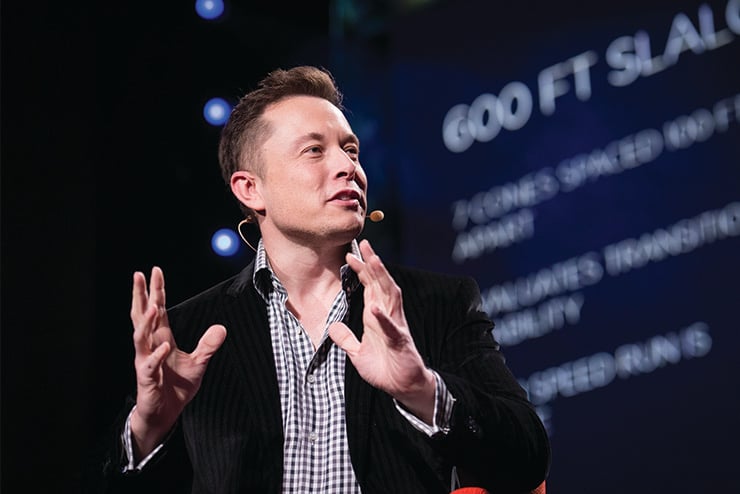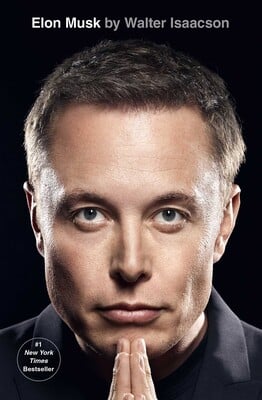by Walter Isaacson
Simon & Schuster
688 pp., $35.00
Just days before Christmas 2022, not long after Elon Musk executed his controversial and tumultuous acquisition of the social media platform Twitter (now renamed X), he learned there was trouble with a data storage center in Sacramento where many of Twitter’s servers were kept. The center’s owners were increasingly worried that the unprofitable Twitter would not be able to make its payments.
Musk had been looking to move the servers to a more cost-effective location. So, when told by two senior Twitter employees that it would take up to nine months to move the servers, Musk would have none of it. He redirected his plane mid-flight, which was en route home to Austin for the Christmas holiday, to Sacramento to see what might be done.
As his biographer Walter Isaacson describes, upon arrival, Musk waved off recommendations to wait for a contractor to lift the floor panels so he could inspect Twitter’s servers. Instead, he borrowed a pocket knife from a security guard to loosen the panels and raise them himself. He then slid beneath them and unplugged wires to confirm that he would, in fact, be able to move the 2,500 pound computer racks into trucks. Here he was: the richest man in the world, lying on his back, screwdriver in hand, trying personally to execute a move of his company’s servers.
This is Musk, both as portrayed by Isaacson and as we know him ourselves. Unlike so many other CEOs, Musk connects with the public directly via his tweets, which often seem to come off the cuff. There is an intensity and restlessness characterizing his actions, and he pays the price for that. He apparently starts many mornings vomiting over a toilet because of high stress. He also has a tendency to nurse decades-long grudges, though this is not uncommon for many who reach the heights of their respective industries.
His restlessness is always driving him on to the next thing, so he struggles to savor success to the point that he has eschewed material opulence for a complete devotion to his work. All of late, there seems to be an element of asceticism in this devotion. Isaacson describes the world’s richest man standing in Twitter headquarters, eating cereal from a paper cup. He also lacks a permanent residence, living instead in a $50,000 manufactured home. What an age it is when the richest man in the world lives not in a palace but in a box!
From the outset of Isaacson’s account, it is clear that Musk, like President Andrew Jackson, “was born for a storm, and a calm does not suit him.” Isaacson, to this point, writes: “If it’s true that money cannot buy happiness, one confirming data point was Musk’s mood when he became the person with the most of it. He was not happy in the fall of 2021.”
When he flew to Cabo San Lucas in Mexico for a birthday party for his sister-in-law Christiana in October, where Claire Grimes performed as DJ, Musk shut himself in his room much of the time and played an online strategy game called Polytopia. “We were underneath this art piece with interactive lights dancing to beautiful music from Claire,” Christiana told Isaacson. “I thought about how our good fortune was thanks to Elon, but he just couldn’t let himself enjoy the moment.”
Musk struggles to delight even in long-sought victories. As Musk himself put it in a 2021 Saturday Night Live appearance, a comment Isaacson would borrow for the biography’s epigraph, “To anyone I’ve offended, I just want to say, I reinvented electric cars, and I’m sending people to space in a rocket ship. Did you think I was going to be a chill, normal dude?”
After the Sacramento server move, within days of successfully completing it against the odds, Musk moved onto his next trial: getting the most powerful rocket ever to fly into orbit.
Isaacson’s portrayal of how Musk manages his time is fascinating. Running three times as many companies as did Apple founder Steve Jobs (another Isaacson biography subject), one wonders how Musk does it. His intelligence surely helps. As Shivon Zilis, the director of operations at Musk’s Neuralink and mother of three of his twelve children, put it, “I learned more unique lessons from Elon per minute than any other human I’ve met.”
Musk’s seeming ability to do it all is also partially explained by his restlessness. There is also his sheer commitment to purpose, his belief that he is working in service to humanity. This enables him to dig through Twitter’s code, pour over Tesla designs, and still make it to his weekly design call at his Optimus robotics company, often all in the same day.
With the exception of some video gaming, Musk does not indulge in the hours of leisure time per day that J. D. Rockefeller did, as described by his biographer Ron Chernow. Titans of industry tend not to be like the rest of us, as William Shawcross pointed out in his biography of Rupert Murdoch. Shawcross wondered what drives their ever acquisitive, ever-striving mindsets: “What makes any of these people run? It’s not just peculiar to Rupert. It isn’t greed. I don’t think it’s even power…”
While certainly less comprehensive and detailed than biographies of other business magnates, Isaacson’s treatment of Musk has the potential to be more successful in seeping into the public consciousness. Warren Buffett’s investment partner Charlie Munger considered Titan, Ron Chernow’s 2004 Rockefeller biography, to be among the great business biographies, and I agree. But the world of reading has, unfortunately, changed in the 19 years between the publication of Titan and Elon Musk. This is, after all, the age of “stolen focus,” and Isaacson seems to have written with that fact in mind; the chapters are almost disarmingly short and the print is not terribly small. Compared to earlier Isaacson biographies, like his 2003 treatment of Benjamin Franklin, here Isaacson zips along, boasting 95 chapters compared with 18 in Benjamin Franklin: An American Life.
Isaacson is easily among the most famous living biographers and it’s unlikely another biographer would have been granted this level of access to Musk, or to the other famous people who know him. From Richard Branson to Bill Gates to Larry Ellison to Congressman Ro Khanna, the breadth of interviews Isaacson conducted to write this book is staggering.
Related to any discussion of Musk now, nearly midway through the 2020s, is the ever-present pall of politics. It may seem unfortunate that Musk should be known primarily for his politics among casual observers rather than for his tireless efforts in technology and innovation: for giving us Tesla and SpaceX. Then again, Musk himself has repeatedly emphasized the importance of politics, even going so far as to argue that “the woke mind virus” represents the greatest threat to humanity reaching its potential.
Despite clearly not sharing all of Musk’s politics, Isaacson succeeds in remaining eminently fair to his subject, who is increasingly a recipient of scorn from most viewers of CNN, the company Isaacson once ran. Isaacson’s latest book has paid the price for this dispassionate analysis by receiving unfairly negative reviews, which certainly seem politically motivated.
Through Isaacson’s compelling treatment of his subject, we gain insights into Musk’s mind: that he believes his businesses to be a more effective force for the greater good than any philanthropic initiative he might champion; that bankers contribute little of value to society, a viewpoint informed by an ill-fated internship he once had at Bank of Nova Scotia; and, following Solzhenitsyn, that discomfort is good for you. Also, if one loses everything while daring greatly, so be it.
Musk surely would reject Henry David Thoreau’s dictum that “a man is rich in proportion to the number of things which he can afford to let alone.” He applies himself to numerous pursuits. Crucially, though, he does not pursue every possible worthwhile endeavor. He is dismissive—at least for now—of life-extension medicine, an area of technology increasingly of interest to many of his fellow Silicon Valley business magnates. Instead Musk, as one commenter put it, “races toward death,” and has said he views his mortal end as likely to come “as a relief.”
There is very little Prince Hamlet in Musk, and Isaacson notes his preference for decisiveness above all else. “If we don’t make decisions, we die,” Musk told him.It is no surprise that he chose to drop out of Stanford’s Ph.D. program on his second day. He almost certainly would have found unfulfilling the world of contemplation and essay writing, which too often drifts into naysaying and irrelevance. Although in a way Musk is the ultimate modern, he seems intuitively to understand the wisdom of centuries past, that “man’s life was made for action.”


Leave a Reply